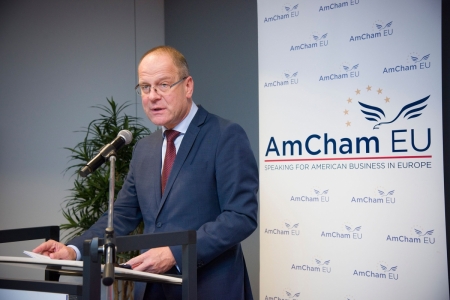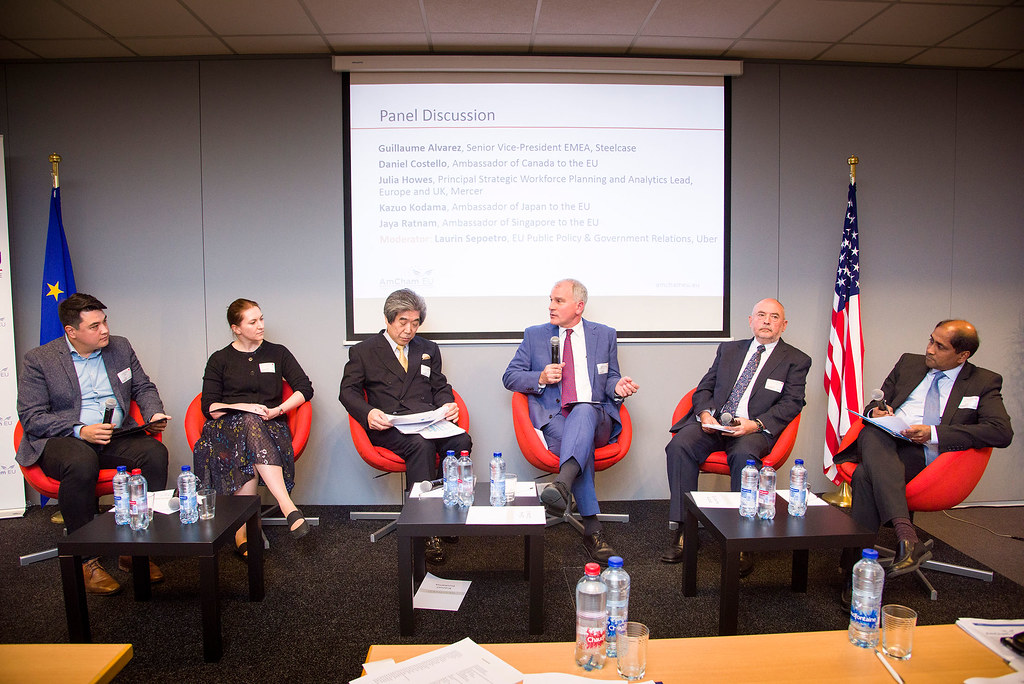You are here
A global perspective on the Future of Work
The Future of Work will pose significant challenges, but will also present unparalleled opportunities. While conversations on how to prepare for this transition tend to remain EU-focused in Brussels, this issue affects countries around the world.

On Wednesday, 10 October, AmCham EU welcomed government and business leaders, including three Ambassadors, to gain a global perspective on the Future of Work and to exchange best practices.
The event was opened a keynote speech by Tibor Navracics, EU Commissioner for Education, Culture, Youth and Sport, who gave a comprehensive overview of what the EU has achieved in preparing Europeans for the future of work. Though the list of achievements is long, the Commissioner regretted not being able to propose harmonised STEM education at the EU level during his term. He sees this an absolute priority that could bring unprecedented benefits, since STEM ‘is a universal language that does not have political or cultural sensitivities’.
Canada, Japan and Singapore, the three countries represented on the panel, all shared similar reflections on the Future of Work, but had different priorities in addressing this issue. While Canada was looking to empower the marginalised and create a system that provided the necessary security for reskilling, upskilling and a more suitable work-life balance, Japan is facing a rapidly aging population. By 2035 the Japanese population will have decreased to 88 million from the 127 million in 2018. Moreover, of those 88 million 40% will be 65 or over. This represents a major challenge for Japanese authorities, who aim to remedy this by raising the pension age and reskilling and upskilling older workers. Meanwhile, Singapore represents a special case, as the country is small and wealthy enough to be able to quickly react to new trends and therefore prepare its labour forces for the future. Through successful initiatives, such as the tripartite education system, which brings together government, industry and civil society, Singaporean authorities promote relevant and impactful life-long learning.
While the three countries have unique challenges to face, such as aging, skills shortages or integration of unskilled labourers, they have all turned to innovative solutions.
The EU should take the opportunity to learn from their experiences and promote a continuous exchange between all stakeholders. After all, as the Singaporean Ambassador put it, ‘Getting the future of work right is getting our future right.’
AmCham EU commissioned Mercer to identify the disruptions that will impact business needs and the available human capital. Based on this, we developed concrete policy recommendations to ensure workers are equipped with the rights skills necessary for future labour markets.
Speakers included:
- Keynote: Tibor Navracsics, EU Commissioner for Education, Culture, Youth and Sport
- Guillaume Alvarez, Senior Vice-President EMEA, Steelcase, and member of AmCham EU Executive Council
- Daniel Costello, Ambassador of Canada to the EU
- Julia Howes, Principal, Strategic Workforce Planning and Analytics Lead, Europe and UK, Mercer
- Kazuo Kodama, Ambassador of Japan to the EU
- Jaya Ratnam, Ambassador of Singapore to the EU
- Moderator: Laurin Sepoetro, EU Public Policy & Government Relations at Uber

